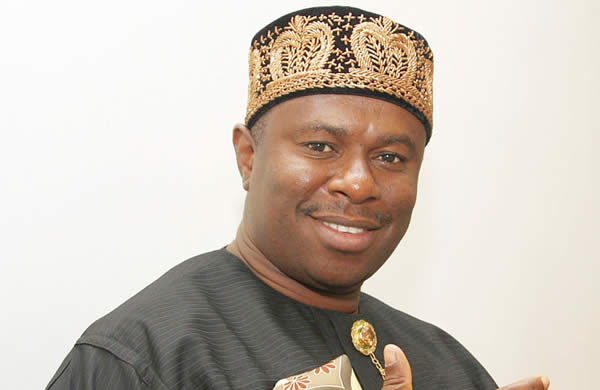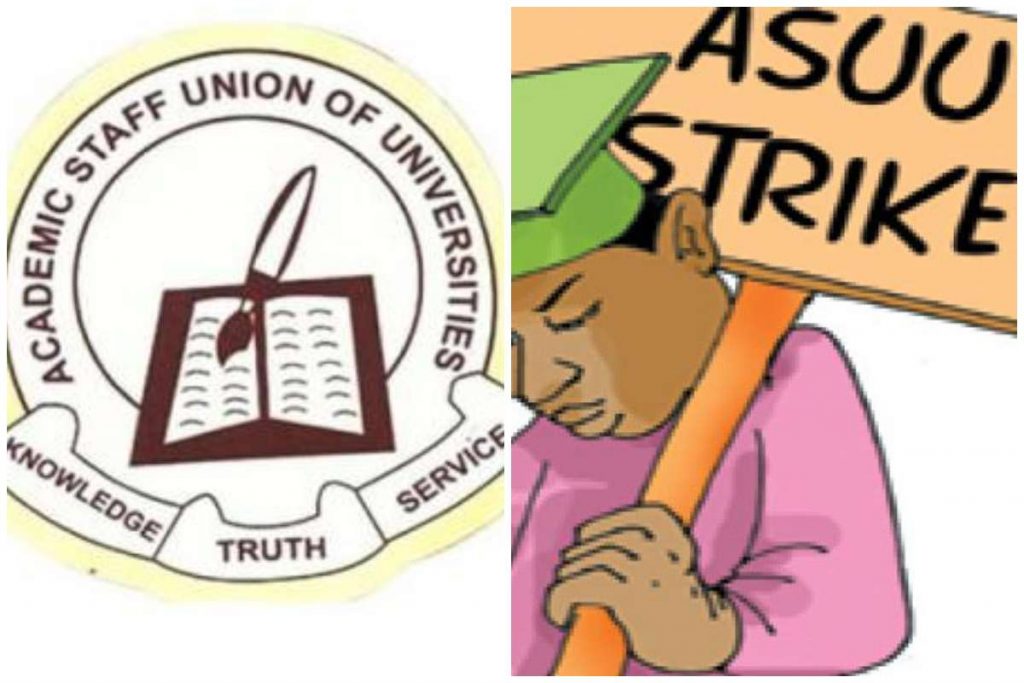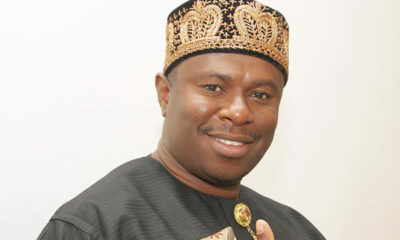News
The political economy of cement

By Dakuku Peterside
Cement and concrete are synonymous with strength; the strength of the economy and infrastructural development. Cement is specifically an indicator of how we prioritise housing, roads, and other infrastructure projects that rely on it. When cement prices go up consistently, it reverberates across the country, sending cold chills down the spines of many. It means fewer people can afford homes, a fundamental human right. Although cement is just one ingredient in the construction industry, it has come to represent the industry itself, so the affordability of cement represents the affordability of houses and other concrete-based constructions. To millions of Nigerians who are nursing the hope of owning their own homes, an increase in the price of cement threatens that hope, and in a country where hope is the only viable anchor against many debilitating odds, there is outrage and panic among many. Besides the link of cement to our collective psyche of home ownership, cement is also about the construction industry, public works,local manufacturing industry, and the employment it generates.
The current cement price hike is indicative of the economic degradation of Nigeria and the complexity therein. It showcases the interconnectivity of a nexus of factors that come together to have a stranglehold on our economy and how the government tackles the problem of excessive hikes in cement prices often is a case study of the government’s dominant reactionary approach to solving sensitive social issues and a metaphor for wrong application of policy in our society. It also indicates how the government misdiagnoses problems and applies inappropriate treatment at the policy level.
In a mixed economy like ours, the government plays a crucial role in shaping the economy, and in some cases, it is the highest single stakeholder in some sectors of the economy. The government is a primary consumer in the construction industry because of the many infrastructural projects it builds. Therefore, the government is a significant stakeholder in cement. Nevertheless, its primary role is to create an enabling environment for the market forces to play their role in determining the cement price while ensuring that the regulatory framework constrains market arbitrariness. This is more preventive than reactionary. However, when the systems and structures put in place to guide the market fail, the government is expected to intervene in the interest of society. This intervention must aim to produce public value by diagnosing and solving problems appropriately. Appropriate diagnoses are pivotal to applying the correct measures that bring sustainable solutions. We miss the point when government officials act like elected kings, using maximum coercive powers to solve a problem that requires thinking and collaboration. Cement is a case in point.
The price of cement, using a 50kg bag as an indicator, between May 2023 and January 2024, a period of about six months, has increased from N4,250-N4,500 to N12,000-N13,000. This is an increase of between 100 percent to 200 percent. Almost all construction industry segments reacted to this astronomical rise in price. There was a public uproar, and the government applied three knee-jerk reactions: the first was to threaten the cement producers to bring down prices or face dire consequences; the second was a threat to open the borders and allow massive importation of cement to flood the market and force the price down; and the third is another threat by the legislature to probe the reasons for the escalating cost of cement. This is indicative of the mindset of our government officials. But realistically, we cannot solve problems by threatening everybody.
The most critical underlying factor in the cement price hike albatross is that the government is caught between protectionism (protecting the local cement industry) and trade liberalisation to curtail prices. The politics of the recent cement price hike goes beyond the fractures in the Nigerian economy. There is a perception of the politics of cement monopoly. The Obasanjo presidency initiated a policy of selective protectionism on certain items to protect local industries. Things like cement, fruit juice drinks, pasta and sugar benefited. This enabled significant industrialists to set up enormous plants for these items. There was an unwritten understanding behind these concessions about these local investors reciprocating by keeping prices in check. The belief is that allowing international competition would have modulated the local costs of these items, but the quasi-monopoly policies protected them. This is another dimension of the challenge that the government needs to untangle.
On the other hand, cement manufacturers have raised fundamental issues that need appropriate diagnosis and solutions proffered. Issues raised by cement manufacturers are grouped into 5: first, with the general paucity of power in Nigeria, almost all manufacturers generate their own energy, and many rely on gas. Despite being a gas-endowed nation, it is simply unavailable – a paradox of plenty. The available gas is denominated in USD and the price has increased by over 300% in the past 6 months. Second, Cement production relies on many imported inputs such as gypsum, machinery, excavators, explosives to blast the mines, spare parts, and propylene to produce bags, all of which are imported using USD. The foreign exchange is just not available, and the USD volatility against the Naira has not helped matters. Third, customs duties are indexed in USD, and lately, it has moved from 450/USD to 1,700/USD in just a few months, a more than 300 percent increase. Fourth, the cost of diesel, which is critical in the transportation of cement and for excavators to mine limestone, has tripled over three months. Fifth, the unfriendly operating environment characterised by corruption, strangulating bureaucracy and multiple taxation is devastatingly affecting the industry.
Addressing this issue requires a comprehensive approach involving various stakeholders. A starting point for diagnosis of the challenge is to find out why gas is not available, why we cannot transport cement by rail, what can be done on the matter of foreign exchange components in the cement production sector, tax harmonization, General insecurity, and undue bureaucratic interference to complex issues of market forces. Any solution that does not address these is, at best, jaundiced and unsustainable. It is myopic to think that the government will ignore the significant external and internal intervening variables underpinning the excessive hike in the price of cement, whip the industry to an agreeable price, and assume the problem has been solved.
All factors considered, because of the socio-economic impact of cement, the government needed to diagnose the challenge correctly, consult widely, and develop a sustainable policy solution. The impression I get is that this is not the case . The way we are going, many manufacturing concerns in the country will go down unless something is done about FX, operating environment, import duty, power and, most importantly, corruption. If cement prices continue to skyrocket, the cost of public infrastructure will escalate, many will lose their jobs, and the nation will be thrown into further economic depression. There may not be a straight answer to resolving the paradox of cement price hikes, but it is urgent and imperative that a holistic approach to tackling the problem is followed.
It’s important to note that addressing the high cost of cement requires collaboration between the government, industry players, and other stakeholders to implement sustainable and practical solutions. The government must work with the cement industry to develop policies that stabilise prices and prevent unnecessary fluctuations. It must enforce policies that ensure fair competition and avoid price gouging. It should encourage healthy competition in the cement industry by promoting new entrants with requisite capacity, preventing monopolies, and streamlining the regulatory processes to make it easier for new players to enter the market. It should invest in infrastructure development to improve transportation networks and reduce the cost of transporting raw materials and finished products. Put mildly, the government must create an external environment that is business-friendly.
The cement industry on the other hand must implement energy-efficient technologies to reduce operational costs and explore alternative and renewable energy sources to power manufacturing plants. They should invest in research and development to find innovative and cost-effective methods for cement production and explore new materials or processes that could be used as alternatives to traditional cement. They should encourage using local materials and resources to reduce dependence on imported inputs and support the development of a robust local supply chain for raw materials. They should desist from arbitrary increases in price just for the sake of maximising profit, especially given the concessions the government has given by protecting the industry from foreign competition.
Our housing and infrastructural needs are enormous. A country of over 200 million people needs cement to build houses for people and construct basic infrastructure. The high cost of cement can only exacerbate the paucity of delivering on these essentials. Therefore, all stakeholders must work collaboratively to ensure the availability of cement at affordable prices.
News
UniAbuja: ASUU begins indefinite strike


The Academic Staff Union of Universities, ASUU, Abuja chapter, has begun an indefinite strike to draw attention to developments bordering the union.
The Abuja chapter of ASUU announced its decision to embark on the strike on Thursday at the end of its congress, held at the Permanent Site of the institution.
Sylvanus Ugoh, who is the UniAbuja Chairman of the union, told Leadership that the union had resolved to embark on a total and indefinite strike with immediate effect.
More to follow…
News
Senate confirms minimum age requirement for admission into universities


The Nigerian Senate has made it clear that the statements regarding the potential increase of the age limit to 18 years were individual viewpoints.
The Senate stressed that any adjustments to the age limit would require proper legislative procedures, whether they involve lowering or raising the limit.
Chairman of the Senate Committee on Media and Public Affairs, Adeyemi Adaramodu, made this known in an interview with journalists on Wednesday.
Recall that last week, Prof. Tahir Mamman, the Minister of Education, stated that the government is thinking about changing the minimum age for entering universities to 18 years old.
“Comment on the minimum age requirement for admission is not a law,” the lawmaker said.
“So it is just an opinion. It’s not a law. By the time the Senate resumes, whoever wants to bring that one out to make it a law, will now bring it and then the procedures will take place.
“You can bring whatever to the floor in form of a bill. When you bring it, there’s going to be public hearing.
“All the stakeholders will sit down and talk about it. The parents, teachers, legislators, civil society organisations, even foreign organisations.
“We will sit down and talk. Even if they say that the minimum age should be 30 or 12, we will all discuss it in an open forum. So it’s still a comment which cannot be taken to be the law.”
News
Alleged Naira abuse: Cubana Chief Priest, EFCC explore out of court settlement


A Federal High Court in Lagos has fixed June 5 for report of settlement in a case against celebrity bartender, Pascal Okechukwu, popularly known as Cubana Chief Priest, over alleged abuse of the naira.
The Economic and Financial Crimes Commission (EFCC) had on April 17 arraigned Okechukwu on three counts of allegedly spraying and tampering with the naira notes during a social event at Eko Hotel in Lagos.
He had pleaded not guilty to the charge and was granted bail in the sum of N10 million.
Justice Kehinde Ogundare had then adjourned the case until May 2, for hearing of the preliminary objection and trial.
When the case was called on Thursday, Mrs Bilikisu Buhari appeared for the prosecution, while Mr Chikaosolu Ojukwu (SAN), announced appearance for the defendant .
The defence counsel informed the court that the parties were exploring a settlement and have applied that the matter be settled pursuant to the provisions of Section 14(2) of the EFCC Act.
He told the court that if the prosecution confirmed the position as true, there would be a need to apply for a withdrawal of the defence’s preliminary objection and allow for a reconciliation.
In response, the prosecutor confirmed the position as stated by the defence counsel and told the court that the application was still being considered.
Following the position, the defence counsel applied for a withdrawal of the preliminary objection since there was no objection from the prosecution and the court granted the same.
The court, consequently, adjourned the case until June 5, for the report of settlement.
In the charge, the defendant was said to have tampered with the funds in the denomination of N500, while dancing at the social event in Eko Hotels and Suites.
The offence contravenes the provisions of Section 21(1) of the Central Bank Act of 2007.
The EFCC had on April 5 secured the conviction of popular cross-dresser, Idris Okuneye, also known as Bobrisky, on similar charges for which he was sentenced to six months imprisonment.
-
capital market2 years ago
Rt.briscoe, FBNH, Others halts negative performance of stock market
-
Finance3 months ago
Court orders Sen. Victor Umeh to repay N136m bank debt to AMCON
-



 Abuja Update2 months ago
Abuja Update2 months agoUNDP, FG partnership needed to achieve inclusion, equity- Minister
-
Abuja Update1 month ago
Banks drive stock market performance with N147bn gain
-



 Business1 week ago
Business1 week agoTingo Group unveils Tingo Electric, Tingo Cola drink at Lagos launch
-



 Health2 weeks ago
Health2 weeks agoCapacity training will reduce migration of health workers- NPHCDA
-
News4 months ago
Oil thieves sponsoring malicious media campaign against Navy – Spokesman
-



 Infotech1 month ago
Infotech1 month agoWorld Backup Day: NITDA urges Nigerians to ensure backup of data








